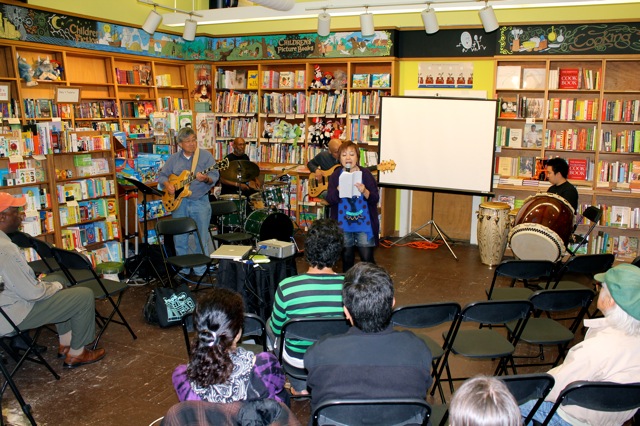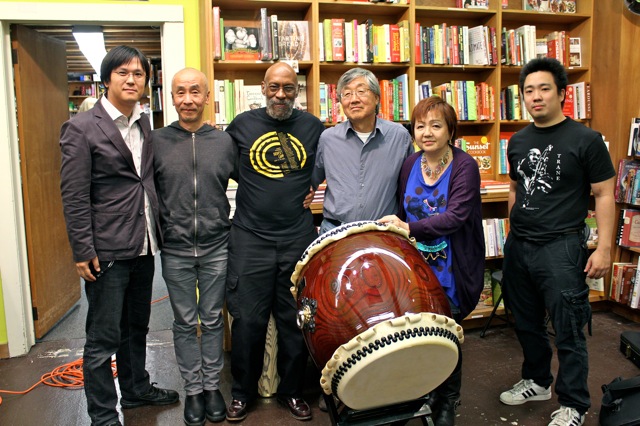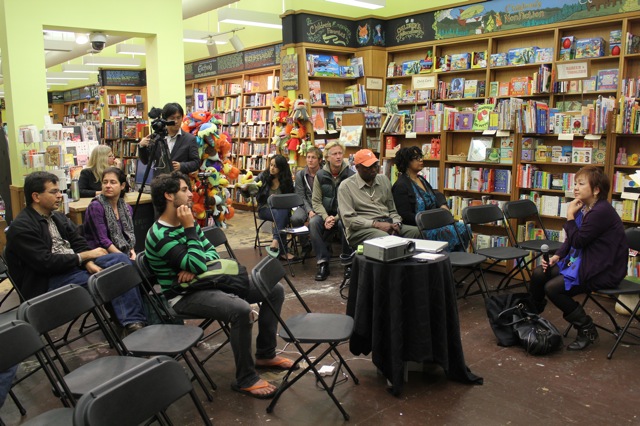My book “The New and Selected Yuri _ Writing From Peeling Till Now” in the Cornell Alumni Magazine:
“In her collection of new and selected poems, Kageyama debunks cultural stereotypes and explores how racism and sexism scar people.”
A mention in the Cornell Alumni Magazine

Reading at a San Francisco book store



Reading at a San Francisco book store TUE Aug. 16, 2011 with (from left to right) Yoshiaki Tago (filmmaker), Hiroyuki Shido (bass), Eric Kamau Gravatt (drums), Makoto Horiuchi (guitar), Yuri Kageyama (poet) and Isaku Kageyama (percussion, taiko).
Photos by Annette Dorfman.
The best thing about the reading was that Milton Murayama, author of “All I Asking For Is My Body,” whom I had not seen in years, came with his wife Dawn because he saw it in The San Francisco Chronicle.
He told me the day he would stop writing is the day he dies.
So much like Milton _ still the same after all these years.
He had that same twinkle in his eye when he said those words like a promise.
Death can’t be all bad if we can keep writing till the day we die.
A Letter to Isaku in Konch magazine
My piece on Japan’s nuclear disaster, “A Letter to Isaku,” and all our children, is published in the new issue of Konch Magazine from Ishmael Reed Publishing Co.
Review of The New and Selected Yuri
Charles Whipple reviews The New and Selected Yuri:
“Then you pick up The New and Selected Yuri. Then you reach into her body and pull out her heart and turn it around in your hand as you listen to everything it has to say. You listen, and you learn. You tremble. And you weep. It makes no difference if you’re male or female. You weep. There’s not much laughter in the selected Yuri. Hers is not a humorous point of view. But it’s real. It shimmers. It envelopes you. It smells and tastes full of reality. There is no Chanel between the lines of Yuri’s prose and poetry. There’s blood. There’s the reek of death. There’s the shadow of a life that cannot be, a worm, she calls it. There’s reality. Not seen through a glass darkly, but glared at in the full light of day, often with the help of a 7X magnifying glass. You may not love everything Yuri has written, but you’ll not soon forget it. How much more power can I put into a recommendation? Try it. Just try it.”
Charles T. Whipple, author of A Matter of Tea, 2010 Oaxaca International Literature Competition winner.
becky nao
becky nao
a poem by Yuri Kageyama
becky nao
kicked me so my shins turned purple
taunted me daily mimicking my voice
becky nao
believed there was only one slot
for an Asian girl in fourth grade class
becky nao
the white girls weren’t rivals
only me, the one other Oriental girl,
becky nao
slit eyes and black hair,
good grades, neat handwriting
becky nao
if i fell dead, gone, wiped out,
she could be that survivor yellow girl
becky nao
who’s going to tell us apart?
so there can be only one of us
becky nao
flicks her eyelashes at blond boys
flaunting a fetish, even at age 10
becky nao
fat face, fat calves
her fat belief as the solitary token
becky nao
hatred curled tight in a nasty gnarl
all for wishing to be that China doll
becky nao
wise words
DO YR ART D WAY U WANT
ANYWAY U WANT
ANY WANGOL U WANT
ITS UP TO U/WHAT WILL WORK
FOR U.
_ from “Catechism of d Neoamerican Hoodoo Church,” a poem by Ishmael Reed.
learning about pride
as a parent, i have always tried to instill in my son pride in one’s identity (race, culture, national origin).
but i don’t think i was ever truly proud.
somewhere deep inside, there was that feeling of being a second-class citizen because i was not white/Anglo-Saxon/a Westerner/an american.
asserting one’s pride is the mirror image of that feeling of inadequacy.
if you were really so proud, you wouldn’t need to keep saying it.
the whole idea of having to say it over and over again means you aren’t so sure and you aren’t so proud.
watching my son grow up to be a taiko drummer has helped me learn what true pride in one’s identity is.
because there is more to it than just telling yourself over and over that it’s OK not to be white.
it is about seeking meaning in your life, pursuing a way of life, including everyday things like the place where you choose to live, the music you choose to listen to, the artists you emulate as your models.
taiko is all about being Japanese although it is a strong statement that holds appeal to the international audience in the same way that the music of Paganini or Mozart holds appeal to the international audience, including many Asians.
in that sense, i have never really been Japanese because my cultural references are Western _ rock ‘n’ roll, James Joyce, Biblical Salvation, Claude Monet.
there is nothing really wrong with this because being international is a good thing, and art is about transcending the confines of prejudices and boundaries of consciousness.
but watching my son grow up to pursue a Japanese form of music is helping me come to terms with the incompleteness and imperfections of my pride.
now i know, i was never really proud.
i was always ashamed and felt inadequate, even afraid.
i was never sure of what i was trying to pass on to future generations as pride.
or that was precisely why i was so determined to teach my son that pride.
but when i saw that pride staring back at me in my son and how beautiful and oh so Japanese taiko can be,
i was confronted with pride in its truest and purest that stem so deep from one’s soul from someone so close to me that he is a part of me.
and so now that pride is mine.
food for thot
food for thot
a poem by Yuri Kageyama
japanese cars must be like sushi, tempura, kaiseki
the designer pontificates at a party
to add value and defy the challenge from hyundai of korea
like yakiniku korean barbecue and bibimbap
think of all the poor people in india
the nun swishing her black habit prays
the chicken soup swimming in the urn turns into urine and
the bread into styrofoam sponge in our throats
let’s have a picnic here, mommy, OK?
my son plunks down in the grass
he eats boiled eggs, claiming his place in the japanese family,
believing they are delicious, the best in the world
when will my husband be able to eat again?
my mother asks the doctor, who answers, “never”
after brain surgery, tubes trickle paste through a hole in his stomach
he gurgles in mucus, his eyeballs batty with fright
Move that poem
Today, I got “MoveThatPoem,” one of just five books in the world, created by poets from Spain _ Miguel Jose Aniceto Bardisa, Rafel Llobet Deia, and Fco. Javier Barrera Barcelo (seen in photos reading at the Moon Stomp in Tokyo) _ for an experiment into poetry and mobility, to answer the question of what will happen to this book if it gets passed from poet to poet, crossing national boundaries, language and cultural differences, and to see what the power of connection of poetry does to the problems of physical space: “What has happened to the inner journey of the poet,” the poets ask.
“The goal of the MoveThatPoem initiative is to make the poetic object, as the physical object of the project, travel as an independent entity and be transformed thanks to the individual recipient’s interaction with it …. Why poetry? Because we believe that poetry is a universal concept present in all cultures. For this reason, the ultimate concept of the MoveThatPoem initiative does not include any attempt to deal with language barriers beyond the original work, but merely to create a poetic object capable of being understood above its formal level by any person who may have it in hand, a living object that can break out of the literary circles in which it has, on occasion, remained buried, a living object that is consolidated as a site of free expression for whomever so desires.”
I will write a poem in this book and then pass it on, keeping in mind that the book wants to be set free in its world travels.
The journey the book takes will be documented on a special website called MoveThatPoem, which will be up by Oct. 30,
or through email: routes@movethatpoem.com